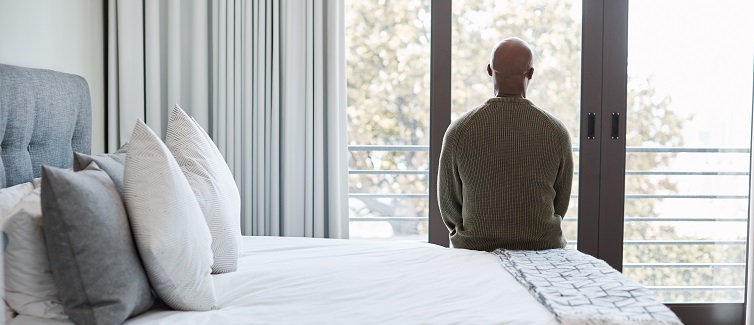Alzheimer’s and other types of dementia can disrupt sleep, and poor sleep can worsen the symptoms of dementia. How sleep is affected varies by individual and the type of dementia they have. Disrupted sleep can put older adults at risk for falls and wandering during the night. It also can contribute to caregiver burnout.
A practice called ‘sleep hygiene’ can help dementia patients get the rest they need and reduce the disruptive sleep-wake cycle. To do this:
- Encourage the person to go to bed and wake up at the same time every day
- Concentrate higher energy activities (like walks and visits) in the morning and early afternoon
- Choose calming and restful activities in the hours before bed
- Limit caffeine to the morning hours or avoiding it altogether
- Avoid screen time 2 hours before bed. The blue light can contribute to poor sleep
Sleep and Alzheimer’s Disease
Sleep changes — such as increased insomnia and daytime napping — can occur in the early stages of Alzheimer’s disease. But these symptoms are more common in the later stages. It is important to address poor sleep with sleep hygiene and possibly medicines. Shortened and frequently interrupted sleep is associated with an increase in the proteins that form the plaque in the brains of people with Alzheimer’s. In other words, poor sleep could cause the dementia to worsen at a faster rate.
Sleep disruption is far more common in the late stages of Alzheimer’s. Those in the later stages of Alzheimer’s are awake about 40% of the night and nap for long periods during the day. Night waking is especially stressful for caregivers, because someone with Alzheimer’s can fall or leave the house during the night.
If your loved one frequently wanders at night, install motion sensors or an alarm on a bedroom or outside door to alert the caregiver. In addition, medicines may help reduce insomnia. Keep in mind many sleep medicines are not appropriate for older adults because the risks of side effects outweigh the benefits.
Sleep and Lewy Body Dementia
Sleep is often disrupted very early on for people with Lewy body dementia. Daytime sleepiness is a common symptom of Lewy body dementia — even when the person has slept well during the night. Insomnia also may occur and is often due to hallucinations, involuntary movements, and stiff muscles caused by the disorder. Medicines can help reduce the symptoms that lead to nighttime waking.
Daytime sleepiness does not require treatment. But if daytime sleepiness occurs at the same time every day, plan for the person to be home at this time.
Sleep and Frontotemporal Dementia
About half of the people with frontotemporal dementia experience disrupted sleep, including insomnia and daytime sleepiness. These symptoms are more pronounced in the early stages of the disease.
To help reduce nighttime wakefulness and daytime napping, keep the person active and engaged during the day. Door alarms or motion sensors may be necessary to alert the caregiver if the person wakes in the middle of the night. Prescription drugs also can help to reduce insomnia in these cases. Sleep apnea and restless leg syndrome appear to be more common in people with frontotemporal dementia. To improve sleep quality, be sure those conditions are diagnosed and treated.
Sources
Alzheimer's Association. Sleep Issues and Sundowning. https://www.alz.org/help-support/caregiving/stages-behaviors/sleep-issues-sundowning
Lewy Body Dementia Association. Daytime Sleepiness is More Common in Dementia with Lewy Bodies than Alzheimer's. https://www.lbda.org/go/daytime-sleepiness-more-common-dementia-lewy-bodies-alzheimer
Dr. Stuart McCarter et al. (2016). Sleep Disturbances in Frontotemporal Dementia. Current Neurology and Neuroscience Reports. https://link.springer.com/article/10.1007/s11910-016-0680-3
Dr. Thomas Roth and Dr. Heidi Brunton. (2019). Identification and Management of Insomnia in Alzheimer's Disease. Journal of Family Practice. https://www.ncbi.nlm.nih.gov/pubmed/31697798
